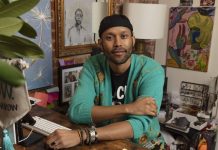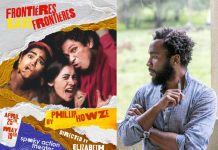Leah Napolin’s Yentl would have to be on any short list of best plays about religion and gender—and the production now at Theater J would have to be among its finest incarnations. Based on “Yentl the Yeshiva Boy,” a 12-page short story by the great Yiddish writer Isaac Bashevis Singer (1902–1991), the play opened in 1975 on Broadway where it ran for 223 performances. I met Napolin opening night at Theater J and asked if I could interview her. I was curious about Yentl through time, in art and life—how it has changed, how the world in which it is perceived has changed, and how it speaks now to a new generation.
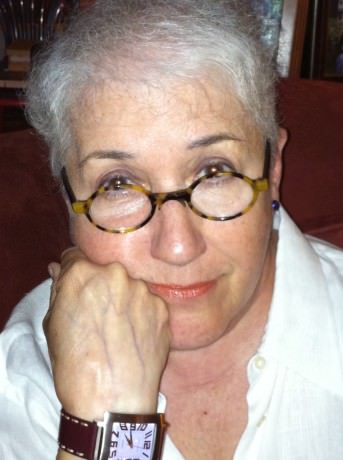
John: At the beginning you talked with Singer about Yentl, right?
Leah: I met him a few times after the play opened on Broadway, when he came to the theater to view a performance. Once before the play opened we were at a backers audition, and once I was invited to tea to his apartment on upper Broadway in Manhattan. Before that I went to Miami, where Singer wintered, with Robert Kalfin (the director of the original Yentl and founder of the Chelsea Theatre Center where Yentl first played), primarily for the purpose of getting Singer to vett the play in terms of cultural authenticity. We were hoping that some of his Old World magic would rub off on us.
What was his inspiration for writing “Yentl the Yeshiva Boy”?
When I asked him where he got the idea, he told me he’d read in a newspaper in the UK about two women who were married for years when one of them discovered that her husband was actually a woman and they divorced. I have since learned another explanation: Singer had a sister, Esther Singer Kreitman, who is one of the forgotten women writers of that time. She was born into this family in Poland with literary genes and shared the same genes but not the same fate. She was a prolific writer, but as a girl she wasn’t expected to do anything more than marry. On her way from Poland to marry a man she had no love for—it was an arranged marriage—her mother threw her work out the window of the train. I’ve been told her mother did so because when they passed through a checkpoint the Czarist Russian police might think there was something in Esther’s writing that was incendiary. But it suggests to me the actual reason was that this wasn’t something Esther was supposed to do as a woman. It’s really a tragic story. The general perception in the scholarly community among those who know of Esther Kreitman is that Singer based Yentl on her. And to me that suggests that though the plot may very well have come from that newspaper article, the character motivation was that of a woman who was unfulfilled as a creative or scholarly person.
Let’s move on to 1975 and the world in which the play opened, when second wave feminism was emerging. How did Yentl’s story resonate then, and how was it seen then?
When I read “Yentl the Yeshiva Boy,” I felt identified with it both as a woman and growing up in the Jewish tradition. A great wave of change was going on that began long before I was born. In Philadelphia in 1919 my mother, who was then a teenager, marched in support of the 19th Amendment giving women the right to vote. When I was in college in the 1950s Simone de Beauvoir’s The Second Sex came out, followed in the 1970s by Kate Millett’s Sexual Politics—foundational texts of the women’s movement that served as rallying cries for my generation. And after the play came out, this dark little gender-bending tale had an impact on many people who identified, as I did, with the heroine’s struggle to reinvent herself, to redefine herself. Part of the power the second wave women’s movement had was that it gave women permission to do this, to examine the conditions of their lives and redefine who they are and what they wanted to do.
When you were working on the play, did you have in mind that it would become like an anthem for a movement? Did you see it coming?
No, not at all. I just wanted to tell a terrific story. Although I was myself, in my personal and intellectual life, very stirred by what was happening in the nascent women’s movement in that time, it never occured to me that the play would become an emblem of anything. It was something that expressed how I felt and, as I was to learn, how a lot of women felt.
It certainly caught hold. I remember those days in New York and the buzz about that play. As I recall it was regarded as a breakthrough in the theater for a feminist view of a woman’s life.
Well, yes, and very quickly that became apparent. My husband and I were teaching at Ohio State University in 1973, and Phyllis Chesler, who had written Women and Madness, was invited to speak. She was sort of a heroine at that point, and when I went to hear her it was a madhouse. So many women students and faculty (and men as well) came to hear her in this giant auditorium there were not enough seats. Afterward I struggled up front to shake her hand and say something to her. A year later I wrote to her inviting her to see the play. She said yes and she rallied a number of women in the movement with her. The people she brought to opening night of Yentl included Gloria Steinem, the founder of Lilith magazine Aviva Cantor Zhukov, Esther Bronner, Andrea Dworkin (and Betty Friedan, who came quietly another night). Afterward they all came to Sardi’s with my family and guests to celebrate. At that point I kind of realized that the cause, women’s rights, had been interestingly and hopefully well served by doing this play.
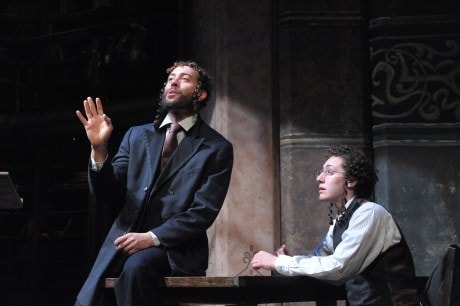
Let’s flash forward to the development of the play recently with the addition of music. What is Yentl now, what does it mean now, and how does it exist in the world now?
Younger women are finding new ways to assert themselves, to challenge traditional values. Globally gender disparity is still an issue. The scope of feminism is changing to embrace not only what’s still going on in the United States, but also the plight of girls and women living elsewhere, under other forms of oppression—women in burqas forbidden to get an education (like Yentl), to drive a car, to choose their own spouses; women subject to violence and coercion. The light of feminism is beginning to shine in other places in the world.
Two years ago I heard that there was going to be a production of Yentl at the Asolo Repertory Theatre in Sarasota, Florida. I was curious to see if the play would still be relevant, and I was curious to hear the music the Asolo had commissioned from a singer-songwriter named Jill Sobule.
This was music that was kind of exciting. It was a combination of folk and rock and bluegrass and klezmer. But I didn’t know what the lyrics were until I got down there.
So the first time you heard the song “Oh, Shit,” what did you think?
Oh, I laughed. Everybody laughed. These are lyrics that speak in a very contemporary voice.
I loved it.
I did too. And I thought they were authentic and heartfelt. There was pathos and there was humor. But the voice was the voice of now.
I decided I was going to take another look at the play. I haven’t changed anything fundamentally about the story, but I streamlined it a bit—she’s maybe 15 pages shorter.
So Sobule picked where the songs would appear and then you did a little reshaping?
Yeah, there are two scripts for Yentl. Anybody who licenses the play to produce it can choose to do it with Jill’s music or without. And of course if anybody asks me, I always say, “Oh, you gotta do it with the music.” The music is wonderful, and I think it adds this other dimension to the play.
It’s getting a glorious production at Theater J. And what really struck me when I saw it is what a young person’s love story Yentl is—actually three young people.
That’s right.
And the love that Yentl feels for both Avigdor and Hadass is extremely contemporary feeling.
Oh yes.
There are productions of Romeo and Juliet that completely go with a young person’s passions, the romance, the hormones, and I really felt that was coming out in this production of Yentl, kind of alongside the religious context.
That’s where I was coming from, John, even in 1975. My director Bob Kalfin and I wanted to say: What is all this discrimination about? We’re just talking about love. And we’re gonna show it in its purest form. Practically the very first words that came out when I sat down to write was Yentl’s opening monologue where she says, “This is a story about the mystery of appearances, the deceptions of the heart, and the divine androgyny of the soul.”
I love that.
What we’re talking about is the androgyny of the soul. It’s not about men and women, men and men, women and women. It’s about people. We felt we had permission to plumb those deeper issues and resonances, which were contemporary but have always existed. We wanted to take this little story out of a kind of literary ghetto, of folk tales, and into the modern world.
I also think that the story of a person who falls in love with a woman and with a man, kind of at the same time, is a very common one. There’s more and more in the culture that reflects that familiar feeling: You fall in love with a person; you don’t fall in love with a gender.
Exactly.
That’s the wonderful liberation in Yentl’s story. Clearly in the beginning she loves her father, she loves the Torah, she loves studying. And then she falls in love with Avigdor and then she falls in love with Hadass, and she loves them so much she wants them to be together, because they love each other. The deepest expression of her love for each of them is to facilitate their getting together.
I know, I know.
And I find that so amazingly contemporary in its emotional authenticity. It feels like it was kind of tucked away in the story, and in the production now it’s coming full on, a kind of polyamorous love triangle.
There was a trangressive aspect to this in 1975 that some people were not ready to deal with, but it was always there.
Yeah, it would have provoked all kinds of uneasiness then, whereas now it’s extremely recognizable, and the truth of it—the romantic, sexual, erotic truth of it—is easier to get.
When I first went down to Sarasota, to the Asolo Rep, they told me that classes of high school students had been brought to see the play, and during the play these audiences laughed, gasped, cried, and cheered—they understood. So while Yentl was saying these same things in 1975, suddenly people are ready to hear them and accept them now.
What Yentl does is risk taking. Avigdor says, “You’ve committed iniquity for spite.” And she says, “No, Avigdor, it’s iniquity for pleasure.” It’s a very daring, heroic bit of risk taking. I think it’s on that level that young people today recognize it and embrace it.
I can’t think of a better place for us to conclude, Leah. This story has made its way through time in an extraordinary way.
A whole new generation of people are discovering it.
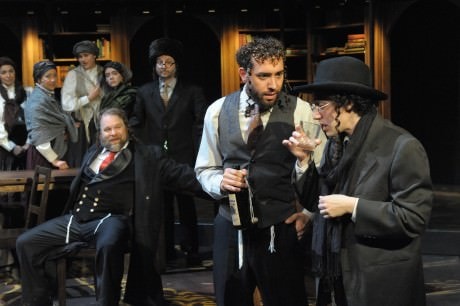
And older audiences who go are seeing it through a young person’s eyes.
I hope so. I hope you’re right.
The whole show was seen through a young person’s eyes, I think.
Well, look at your cast. I was there for the first read-through of the play. And I was so impressed by these actors, these young people. They were not just excited about the play; they were moved by it, because, they said, it reflected so much of what their lives were and their own discovery of themselves.
I think that’s the deepest truth about that piece of art right now. Thank you, Leah.
Likewise, John.
Yentl plays through October 5, 2014 at Theater J at The Washington DCJCC’s Aaron & Cecile Goldman Theater- 1529 16th Street, NW, (16th and Q Streets), in Washington, DC. For tickets, call the box office at (800) 494-8497, or purchase them online.
LINK
John Stoltenberg’s review of Yentl on DCMetroTheaterArts.


